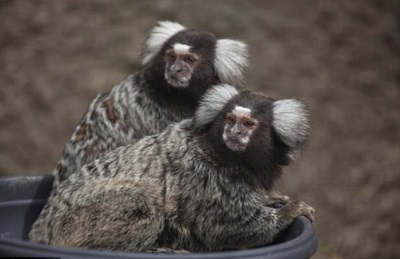Baby marmosets learn to speak in a similar way to human infants, new research has found. According to Daily mail
A baby’s babbles start to sound like speech more quickly if they get regular vocal feedback from adults.
And researchers have found the same type of feedback speeds up the vocal development of infant marmoset monkeys.
The study is the first assured evidence of ‘call and response’ learning in primates besides humans.
Even though marmosets can’t ‘talk’ in the same way humans do, understanding marmoset communication may help us understand the evolution and development of human speech.
‘We wanted to find out whether the idea that monkeys don’t do any learning during their vocal development is actually true,’ said study lead author Professor Asif Ghazanfar, a psychologist.
‘So we picked a species that we know really relies on vocalisations as its primary social signals.
‘What we found in marmoset vocal development very closely parallels pre-linguistic vocal development in humans.’
Although marmoset vocal calls are not as complex as human language systems, vocal development in both species begins with infants making random sounds.
‘When a human infant blurts out something and the parent responds, that’s a contingent response,’ Professor Ghazanfar said.
‘And the more often a parent provides that contingent response, the faster the infant will develop its vocalisations.’
To find out whether the same principle held true for marmosets, Professor Ghazanfar and his colleagues set up an experiment using pairs of fraternal twin marmosets, small, highly social monkeys.
Starting from the day after the marmosets were born, the researchers would separate the infants from the adult marmosets for 40 minutes each day.
In the first 10 minutes, they recorded the noises that the infant marmosets made while sitting alone.
Then, for the next half hour, the researchers gave the young marmosets contingent feedback in the form of audio playbacks of the parent’s calls.
One twin in each pair got consistent feedback, mirroring what a young marmoset would receive from an especially attentive parent.
The other twin got less consistent feedback on their vocalisations.
The team repeated these experiments up until the infants were 2 months old, roughly the equivalent of 2 years old in marmoset years
Even though these sessions lasted less than an hour each day, infant marmosets that received lots of contingent feedback developed adult-sounding calls more rapidly than their siblings.
‘When they’re infants, this call is really noisy,’ Professor Ghazanfar said.
‘It sounds kind of coarse, and then gradually it becomes very clean and tonal like an adult call.’
The researchers said that this system of vocal learning may be linked to the idea that an infant that produces adult-like sounds more quickly is more likely to receive care.
Much like in human social groups, marmosets work in a cooperative environment where multiple members of a group can provide care to infants in addition to the parents.
‘So it’s not only this process of learning that’s similar to humans; ‘ Professor Ghazanfar added.
N.H.Kh

